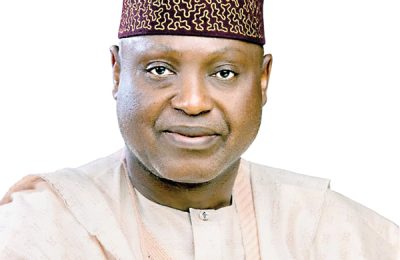Renowned professor of African history, Toyin Falola, has fingered political interference as affecting the proper governance of public universities in Nigeria.
The erudite scholar stated this at the Tenth Distinguished Leadership Series organized by the Abuja Leadership Centre (Tetfund Centre of Excellence in Public Governance and Leadership), University of Abuja, held at the Barcelona Hotel, WuseII, Abuja, on Saturday, June 1, 2024. The event was put together in honor of the outgoing vice-chancellor of the institution, Professor Abdul-Rasheed Na’Allah.
While delivering his keynote titled ‘Governance at the University Level in Nigeria’, Falola, who is the Jacob and Frances Sanger Mossiker Chair in the Humanities and University Distinguished Teaching Professor at the University of Texas at Austin, noted that political intervention from the ruling or opposition elite has negating effects on the successful running of university governance.

He submitted thus: ““Political interference poses a substantial challenge to governance. Universities are meant to be havens of knowledge and independent thinking, but political interference can undermine these principles. Interference can take on different forms, including the selection of university leaders influenced by political factors rather than their qualifications or the impact of political agendas on academic and administrative choices. These practices have a detrimental impact on the autonomy of universities, as they tend to prioritize political interests over academic or educational goals.
“The consequences of political interference have extensive implications. The potential consequence of this situation is a diminished sense of accountability, as university administrators may prioritize their political supporters over the interests of the institutions they are entrusted to serve. This scenario has the potential to cultivate an environment characterized by corruption and nepotism, resulting in the misallocation of resources and decisions that prioritize patronage over the university’s or its students’ needs. In addition, political interference has the potential to impede academic freedom, thereby restricting scholars’ capacity to conduct research or articulate politically sensitive ideas.
“The curtailment of academic freedom has negative consequences, not only for the calibre of research and education but also for the overall function of universities as platforms for critical analysis and discourse. Tackling these challenges necessitates a comprehensive strategy. It is imperative to enhance the financial management capabilities within universities.This may entail the process of professionalizing financial operations within the university, implementing contemporary financial management systems, and developing proficiency in areas such as financial planning, budgeting, and fundraising. Enhancing financial transparency and accountability can contribute to the establishment of trust and credibility among stakeholders, thereby potentially facilitating access to additional private and international funding opportunities.

“In the realm of politics, it is imperative to establish more explicit regulations and norms that safeguard the autonomy of universities against unwarranted political intervention. This may entail implementing reforms to the procedures for appointing university leaders and governing bodies, with the aim of ensuring that these appointments are fair and impartial, free from any political influences. Promoting a culture of academic freedom and fostering inclusive civil discourse within universities can effectively mitigate external influences and uphold the integrity of scholarly endeavours. Accountability and transparency play a crucial role in upholding trust and integrity within the academic community and beyond, particularly in the decision-making processes of universities. This set of principles guarantees that the actions and decisions made by university leaders are not only transparent but also substantiated to all relevant stakeholders, such as students, faculty, staff, and the broader society. In the Nigerian university context, it is of utmost importance to cultivate a culture of accountability and transparency. This is particularly significant due to the obstacles posed by financial limitations and political intervention, which can hinder effective governance and create complexities.”

Earlier, Falola noted that the tension between financial support given to public universities and the issue of autonomy has remained a challenge to university governance. According to him, “The persistent challenge in the governance of Nigerian universities lies in the ongoing tension between financial support and autonomy. In addition, government policies have the potential to significantly influence university governance by implementing legislative modifications that modify the composition and authority of governing entities within universities. Universities must promptly adapt to changes in national education policy, including reforms in governance models and shifts in accreditation standards. These modifications can be motivated by a range of factors, such as the aspiration to enhance educational outcomes, address previous administrative shortcomings, or adhere to global standards of excellence. The dynamic relationship between universities and government bodies is inherently intricate and diverse. Government oversight, particularly through the National Universities Commission (NUC), plays a crucial role in upholding quality and consistency in higher education.
“However, it is imperative to strike a balance between this oversight and the preservation of academic freedom and institutional autonomy. Optimal results are achieved through the establishment of a collaborative partnership, wherein policies and regulations are formulated through consultations with university stakeholders. Additionally, it is crucial to acknowledge the shared objectives of improving educational quality and making meaningful contributions to national development.
“The intricate and diverse nature of the university autonomy and administration in Nigeria is influenced by national education policies. These policies, which are formulated at the national level, frequently seek to tackle overarching educational objectives such as enhancing educational accessibility, enhancing the calibre of higher education, and ensuring that educational outcomes are in line with the needs of national development. Nevertheless, the execution of these policies may have substantial implications for university autonomy, which pertains to the institution’s ability to govern itself without external intervention, specifically in academic, administrative, and financial affairs.”
Falola, however, concludes that “The governance of universities in Nigeria encounters numerous challenges, but it also presents substantial opportunities for transformative enhancement and attainment of national and global educational benchmarks. During this discourse, we have explored different facets of university governance, providing insights into its historical background, structural intricacies, and the effects of colonial legacies and current policies on university autonomy and administration. An essential point to consider from our conversation is the significant impact that efficient governance has on improving the quality and pertinence of higher education in Nigeria. It is increasingly clear that the establishment of strong governance frameworks which prioritize accountability, transparency, and inclusivity is crucial for promoting academic excellence and operational efficiency within universities. Frameworks play a crucial role in addressing challenges such as financial constraints and political interference, as well as leveraging opportunities for innovation and excellence in a highly competitive global environment.
“In order to enhance university governance, a number of crucial recommendations arise. Initially, it is imperative to implement structural reforms that improve the transparency and effectiveness of governance entities. This entails clearly defining roles and responsibilities and ensuring that these entities function without excessive external influence.Additionally, the adoption of technological innovations can greatly enhance administrative processes and promote transparency, thereby increasing the responsiveness and accountability of governance. It is imperative to enhance the utilization of digital tools and platforms in governance processes, with the aim of facilitating access to information and enabling stakeholders to actively participate in governance activities.
“It is imperative to involve a wider range of stakeholders in the governance process. This collaboration should extend beyond conventional limits, involving not only academic personnel and students but also alumni, industry professionals, and the wider community. Implementing inclusive governance practices in universities is crucial for maintaining responsiveness to the needs and expectations of a wide range of stakeholders. This approach enhances the relevance and impact of universities. When considering the future, it is evident that the potential for governance in Nigerian higher education holds great promise, provided that these strategies are implemented with effectiveness. By implementing strategic initiatives to enhance governance structures, harness the power of technology, and promote inclusive stakeholder engagement, Nigerian universities have the potential to achieve recognition not only at the national level but also on an international scale. Implementing governance enhancements can enhance the resilience of universities in addressing global challenges, including technological disruption, evolving labourmarkets, and the urgent requirement for sustainable development.
“Furthermore, the ongoing dedication to enhancing governance in Nigerian universities is expected to initiate a cycle of ongoing enhancement, wherein improved governance results in enhanced academic achievements. This, in turn, serves to validate and strengthen the necessity for robust governance. The implementation of this virtuous cycle has the potential to enhance the quality of education and research in Nigerian universities, positioning them as significant contributors to the nation’s development and the wider global intellectual community. The future of university governance in Nigeria has the potential to significantly impact higher education in the country and serve as a model for other nations seeking to improve governance in their educational institutions. The pursuit of refined and effective university governance presents both challenges and opportunities, offering significant rewards for those who approach it with careful consideration and strategic planning.”
He eulogized the outgoing vice-chancellor, ProfessorNa’Allah for his commitment to the growth of the University of Abuja, stating that “While the Vice-Chancellor of the University of Abuja, for example, he inspired a revolution of infrastructure that helped facelift the citadel and make it capable of competing with others in the global community. His concentration on the quality of infrastructure project came from the understanding that infrastructural projects set any place in motion for true transformation. In the human world, connections between countries, states, and local governments are a recipe for economic transformation. This is also proven to be true in the university system. Once the infrastructure of the academic community is developed, it inspires a new generation of thinkers. But what Na’Allah did was more than an infrastructure revolution. His involvement in the accreditation of additional courses shows how informed and flexible he is in meeting international standards. He understands, for example, that the constantly changing society needs an investment in diverse disciplines, and he became pivotal to this revolutionary act.”
The program was attended by members of both the public and academic communities, including friends and family members of the honoree.
Read Also: Minimum wage: Senate moves to avert strike, meets NLC, TUC








